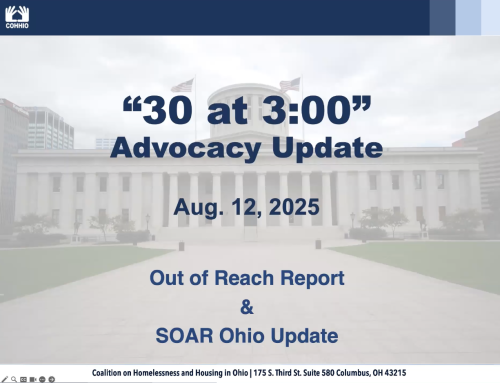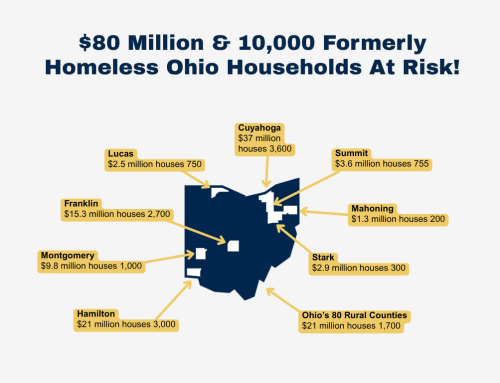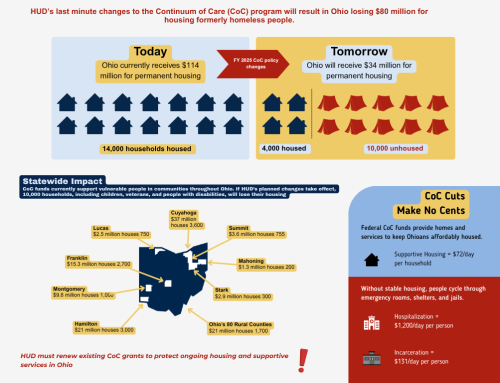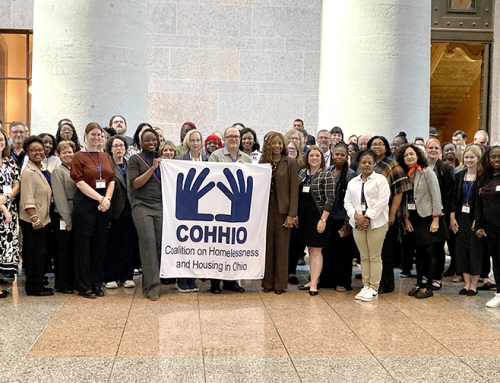The Ohio Senate recently added an amendment to the budget that would dramatically increase taxes on affordable housing properties, jeopardizing the homes of 100,000s of vulnerable, low-income Ohioans. Needless to say, we are fighting this idea tooth and nail.
The $75 billion biennial budget must be finalized in the coming weeks, so time is running out to get this provision removed. If you haven’t already added your organization to our joint sign-on letter with the Ohio Housing Council, or called your legislator expressing opposition to this budget amendment, please do so now. With many allies on our side, we have a good chance of defeating this proposal that would only make Ohio’s affordable housing shortage even worse.
We’ve also been working on several other items in the biennial budget, which must be finalized by June 30:
- The Ohio Department of Health’s Youth Homelessness grant program – we’re asking legislators to continue this $5 million program, and remove an earmark so that providers throughout the state can compete for grant funding on an equal footing;
- Healthy Beginnings at Home – we’re asking to expand Columbus’s successful rental assistance pilot for at-risk mothers to expand it to additional communities in Ohio;
- Housing Now for Homeless Families – we’re working with the administration and legislature to continue investing Temporary Assistance for Needy Families (TANF) funding into local rapid rehousing and homelessness prevention efforts;
- Barriers to food and healthcare – we’re supporting Advocates for Ohio’s Future’s efforts to remove harmful new red tape that will make it harder for people to access food stamps and Medicaid.
At the federal level, policymakers have responded to advocates’ warnings about eviction and homelessness in a big way. The past three relief bills have provided an enormous infusion of temporary funding for housing and homelessness programs. This is a great opportunity for local homelessness and housing providers to ramp up their efforts in the wake of the pandemic.
The American Rescue Plan Act unleashed an unprecedented amount of resources to shore up our country’s tattered safety net, including $42 billion for housing assistance. That came just a few months after Congress passed the December relief measure that included a $25 billion Emergency Rental Assistance (ERA) program. Taken together, these bills will provide Ohio with a total of $1.5 billion in rent relief, which can help repair some of the pandemic’s inequitable damage to struggling tenants.
Gov. Mike DeWine recently signed unanimous legislation to release the first big tranche of federal ERA funds, clearing the way for $564 million to flow to local agencies that are administering rent relief locally. (The U.S. Treasury Department has allocated an additional $212 million in ERA directly to Ohio’s local governments.) Many communities started helping unemployed tenants even before the state allocated $111 million from Ohio’s CARES Act for housing assistance last fall.
Nonetheless, eviction filings have been increasing and the CDC’s eviction moratorium is set to expire soon. There’s an enormous number of people in need that is testing the capacity of some local agencies to disburse the funding quickly. (If you need emergency rental assistance contact your local CAA)
Nobody who lost income during this global health and economic crisis should get evicted for not paying rent while we actually have the means to prevent it. The U.S. Treasury Department issued revised guidance aimed at reducing bureaucratic barriers for tenants, speeding the distribution of rent relief, and prioritizing households with the greatest needs. We must act with haste to get these dollars out the door before the door closes on tenants whose ERA applications are in a paperwork race with eviction court proceedings.
Rent relief is just one of the new resources at our disposal to stabilize vulnerable Ohioans. The ARPA also created several thoughtful new initiatives to prevent the public health crisis from becoming a homelessness crisis:
- $5 billion for Emergency Housing Vouchers to help people experiencing or at-risk of homelessness move into permanent housing. Given damage Covid has inflicted on Ohioans who were already struggling to stay housed, we must quickly seize the opportunity to use these vouchers to prevent and end homelessness.
- $5 billion for the HOME-ARP program to expand housing opportunities for unhoused people, including rental units, non-congregate shelter units, tenant-based rental assistance, and supportive services.
- $10 billion in mortgage assistance, including $281 million to Ohio to help homeowners who are struggling to avoid foreclosure. The Ohio Housing Finance Agency is currently gathering input on how to best ensure these foreclosure assistance dollars get equitably distributed throughout the state.
- $360 billion in fiscal recovery funds for state and local governments to fight the pandemic and help residents recover from the pandemic’s economic fallout.
On that last point, COHHIO has been working with the Home Matters to Ohio and Rebuilding Ohio coalitions to encourage state leaders to invest $100 million out of the state $5.6 billion in Fiscal Recovery Funds from ARPA into homelessness and housing initiatives (download proposal). Ohio’s local governments also received over $5 billion in ARPA fiscal recovery funds – we encourage our partner agencies to advocate with community leaders to use these resources to address local housing needs. (NLIHC info)
The ARPA also has a lot of other assistance that could help the people we serve escape poverty, such as the $1,400 stimulus payments, expanded child tax credits and earned income tax credits, increased healthcare coverage, and more funding for schools (CBPP summary)
Ohio still has a lot of unspent homeless services dollars from the ESG-CV allocation in the CARES Act passed over a year ago. This money is still available to cover emergency shelter operations, homelessness prevention, rapid rehousing, diversion, outreach, hotel vouchers, supportive services, hazard pay for staff, incentives for landlords and volunteers and other activities through Sept. 30, 2022. Reach out to the Ohio Development Services Agency if your organization can use ESG-CV funds.
Meanwhile, additional federal action on housing programs is pending, as Congress debates President Biden’s proposed infrastructure bill, which includes $213 million additional housing supports. We recently sent a letter signed by 105 organizations asking Ohio’s Congressional delegation to support including housing in the final legislation. Thanks to everyone who signed on. This is still an active issue – now is a good time to contact your U.S. House member to let them know that housing is infrastructure.
Here in Ohio, the General Assembly unanimously endorsed a proposal to keep permanent supportive housing exempt from property tax. And state legislators are working on the $75 million biennial budget, which has to be finalized by June 30. We are working to expand the Healthy Beginnings at Home program – a pilot in Columbus that demonstrated how rental assistance improves birth outcomes for at-risk mothers. We’re also advocating to continue funding for the Ohio Department of Health’s new youth homelessness program.
At the local level, we’ve seen a flurry of activity to protect tenants from discrimination and unnecessary evictions. Cities throughout Ohio have been passing ordinances to ban source-of-income discrimination so that residents can use their housing vouchers, pay-to-stay rules so that renters who can pay back rent can continue living in their homes, and even right-to-counsel legislation to give tenants a fair shake in eviction court. We’re starting to help coordinate local advocates to advance these efforts in their communities. If you’d like to get involved, contact our Advocacy Director Gina Wilt.
We’ve all seen so much need, loss, and tragedy over the past 15 months. We can start to recover from this plague by refocusing on the healing work before us. Thank you for helping to advocate for the resources we need to start recovering from this covid nightmare. And congratulations; we now have the means to end the nightmare of eviction and homelessness for tens of thousands of people in our state.
Thanks for helping to house Ohio,
Bill Faith
